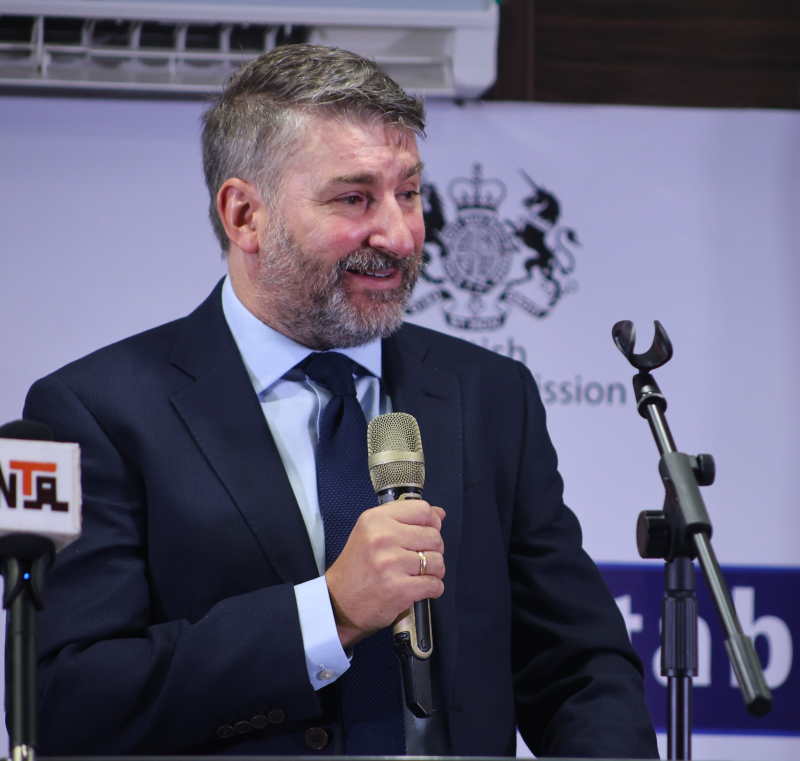
Reported by: Ijeoma G. | Edited by: Gabriel Osa
The Executive Chairman of the Economic and Financial Crimes Commission (EFCC), Ola Olukoyede, has called for stronger collaboration between the public and private sectors to combat money laundering, terrorist financing, and proliferation financing in Nigeria. The call was made during a roundtable discussion on developing a Public-Private Partnership (PPP) model to address financial crimes, organized by the Nigeria Financial Intelligence Unit (NFIU) in collaboration with the British High Commission in Abuja on Tuesday, September 30, 2024.
Represented by his Special Adviser on Regulatory Compliance, Francis Usani, Olukoyede emphasized that financial crimes affect both the public and private sectors and that a coordinated partnership is essential to tackle these challenges effectively. He stressed that the EFCC and its Special Control Unit Against Money Laundering (SCUML) are committed to enforcing regulations and ensuring that Designated Non-Financial Institutions, Businesses, and Professions comply fully. Olukoyede urged stakeholders to strengthen internal systems, enhance institutional vigilance, and build capacity to ensure functional partnerships capable of enforcing regulations and deterring violations.
Highlighting the importance of the PPP approach, Olukoyede assured that the EFCC is prepared to collaborate with relevant organizations in combating economic crimes and corruption, stating that coordinated efforts are necessary for meaningful progress.
In her remarks, the CEO of the NFIU, Hajiya Hafsat Bakari, underlined the significance of collaboration between public and private institutions in light of Nigeria’s efforts to exit the Financial Action Task Force (FATF) Grey List. She acknowledged the progress already made and emphasized that no single institution can address the complexity of financial crimes alone. Bakari pointed out that countries including the United Kingdom, South Africa, Australia, and India have successfully used public-private partnerships to strengthen their anti-money laundering and counter-financing of terrorism frameworks. She expressed confidence that structured partnerships would bridge the gap between policy and practical implementation, reinforcing the country’s regulatory framework.
Speaking on behalf of the Attorney General of the Federation, Lateef Fagbemi, Chika Nnanna noted that Nigeria, like many emerging economies, faces threats from increasingly sophisticated financial crimes. He highlighted the challenge posed by globally networked, technologically advanced criminals who can bypass traditional mechanisms. According to him, adopting a public-private partnership approach is critical to breaking down silos, fostering collaboration, and uniting stakeholders in a coordinated response to complex financial crimes.
William Robinson, representing the British High Commission, commended Nigerian law enforcement agencies for their dedication to combating money laundering since the return of democracy. He encouraged real-time collaboration between regulatory agencies, banks, and law enforcement, noting that emerging technologies, including cryptocurrencies, require new capabilities to keep pace with evolving financial crime methods.
The roundtable discussion highlighted the growing need for Nigeria to adopt innovative and collaborative strategies to strengthen its anti-financial crime mechanisms. Stakeholders agreed that effective public-private partnerships would enhance compliance, deter illicit activities, and ultimately boost public trust and foreign investment in the country.
📩 Stone Reporters News
🌍 stonereportersnews.com | ✉️ info@stonereportersnews.com
📘 Facebook: Stone Reporters | 🐦 X (Twitter): @StoneReportNews


Add comment
Comments